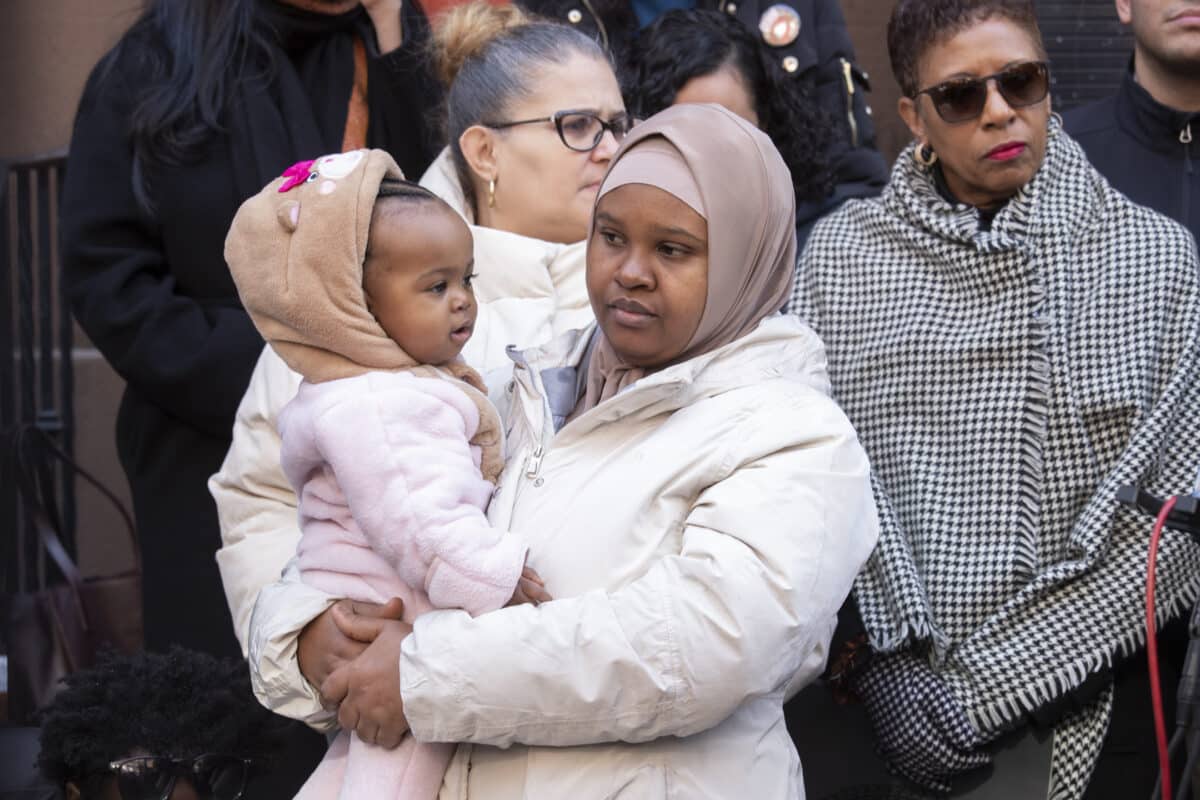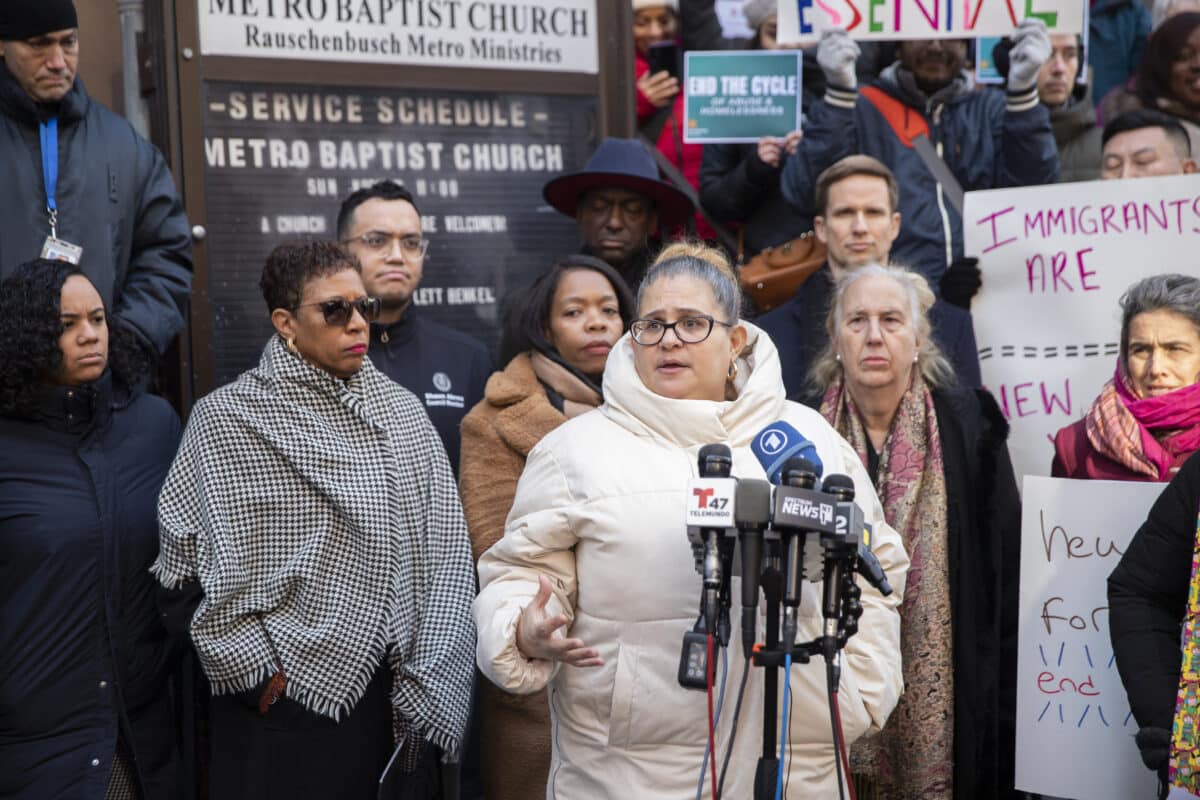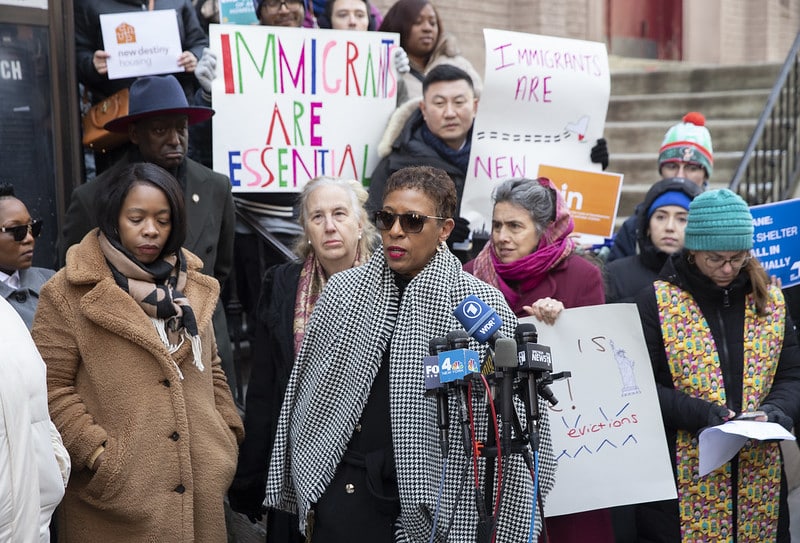City Council Speaker Adrienne Adams slammed Mayor Eric Adams on Monday over his 60-day shelter stay limit for migrant families with children, a policy she described as “counterproductive” and “cruel.”
The speaker made the remarks during a Jan. 22 rally in Midtown Manhattan against the policy, under which migrant families with children began getting evicted from their shelter beds earlier this month. The policy stipulates that families must vacate shelter after 60 days and apply for a new placement at the city’s migrant intake center — located at Midtown’s Roosevelt Hotel.
“As the first mother and grandmother to serve as speaker in the New York City Council it pains me to see young children and families harmed by the 60-day policy,” the speaker said. “I urge the mayor to abandon this counterproductive and cruel, cruel tactic. And instead pursue more sound management that upholds our moral responsibility as the government.”
The speaker was joined by several other council members including Deputy Speaker Diana Ayala (D-Manhattan/Bronx) and advocacy groups like Make the Road New York.
The mayor first implemented the rule in October as yet another means of bringing down the Big Apple’s ballooning shelter census, which currently includes roughly 70,000 migrants, as thousands more newcomers continue pouring into the city each week. The first notices came due on Jan. 8 and more have been expiring each day on a rolling basis.
The rule only applies to newcomer families living in the city’s Humanitarian Emergency Response and Relief Centers (HERRCs) and not its traditional homeless shelters, run by the Department of Homeless Services (DHS), where the majority of them are living.
Since it was announced, the shelter stay cap has been derided by critics as harmful to families. They argue it is both destabilizing to children, by possibly forcing them to have to travel further distances to school, and to parents attempting to get their families out of the shelter system, by making them change mailing addresses.

City Comptroller Brad Lander even launched an investigation into the rule earlier this month — a probe looking at how the policy has been implemented and its effect on the evicted families.
Ayala, who has become increasingly critical of the Adams administration’s migrant crisis policies, went even further than the council speaker in taking the mayor to task.
“It is incomprehensible that two years into this administration we are now looking at a landlord problem, our mayor is a slumlord,” the deputy speaker said. “And a slumlord is defined by a person who has property and who evicts people little by little, by taking away services, by turning off the lights, by not providing heat and hot water, by not providing the basic essentials. That is exactly what’s happening to some of our neediest New Yorkers.”
The administration has pushed back on critics by arguing a similar shelter limit for single adults has helped many migrants find alternative housing outside of the city’s shelter system. Additionally, city officials say they are prioritizing families that reapply to get new shelter beds and attempting to place them close to their children’s current schools.

Mayoral spokesperson Charles Lutvak, in a statement, said the policy has been essential in helping the city manage its limited resources in the absence of significantly more assistance from the federal government. He added that the policy is partially responsible for moving more than half of the migrants who have come through the city’s shelter system out of its care.
“We are using the limited tools available to us, and thanks to, in part, our 30- and 60-day intensive casework policies, we have helped more than 102,600 asylum seekers — more than 60 percent of those who have come through our care — take the next step on the path to self-sufficiency without a single family with children being forced to sleep on the street,” Lutvak said.
Adams last week also credited the policies with helping to bring down the projected cost of the crisis by roughly $2 billion.
The administration said it would allow pregnant women in their third trimester and those with newborns more time before their eviction notices are up, according to a report from the news site The City last week. But Ayala said the mayor needs to go further than just giving the mothers a temporary reprieve from the evictions.
“The mayor needs to roll back this policy, specifically around the women and children,” Ayala said. “It is not enough to say that pregnant women won’t have to leave their place of residence when they’re in that third trimester, that they won’t be bothered if their children are six months old.”


































